LESSON2
新概念二Lesson 2
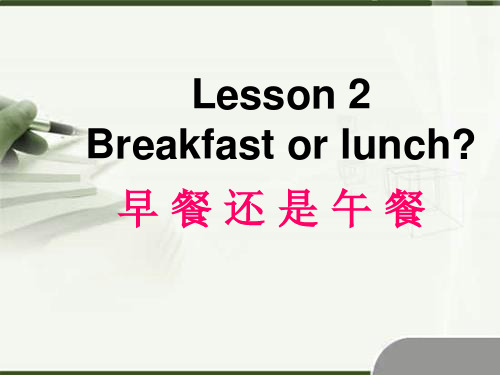
Exercises
A Write out these two paragraphs again. Give the right form of the words in parentheses.
1. I am looking out of my window. I can see some children in the street. The children ___________ are playing (play) football. They always play (play) football in the street. Now a _____ is kicking (kick) the ball. little boy _________ Another boy __________ is running (run) after him but he cannot catch him.
2)how 结构 (以形容词,副词为主) ① how + adj./adv. + 主 + 谓! ② how + adj. + a/(an) + cn.(单)+ 主 + 谓! ③ how + 主 + 谓!(实义动词作谓语)
他是一个多么可爱的男孩啊!
What a lovely boy he is! How lovely a boy he is! How lovely the boy is!
B Write these sentences again. Put the words in parenctheses in the right place. 1. She answers my letters. (rarely) She rarely answers my lettters. 2. We work after six o'clock. (never) We never work after six o'clock.
《Lesson 2》 教学设计
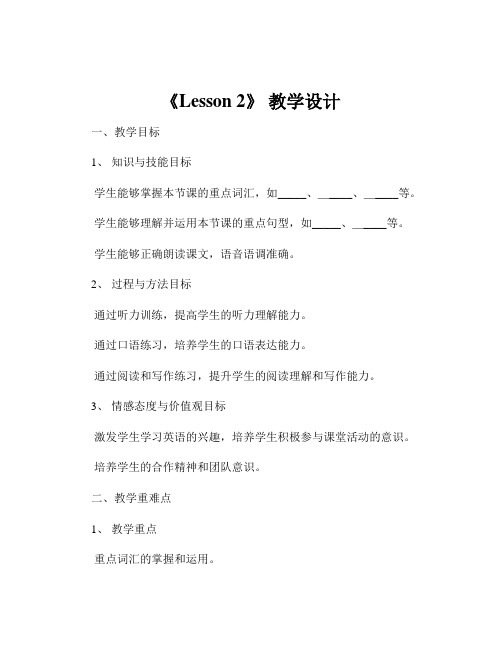
《Lesson 2》教学设计一、教学目标1、知识与技能目标学生能够掌握本节课的重点词汇,如_____、_____、_____等。
学生能够理解并运用本节课的重点句型,如_____、_____等。
学生能够正确朗读课文,语音语调准确。
2、过程与方法目标通过听力训练,提高学生的听力理解能力。
通过口语练习,培养学生的口语表达能力。
通过阅读和写作练习,提升学生的阅读理解和写作能力。
3、情感态度与价值观目标激发学生学习英语的兴趣,培养学生积极参与课堂活动的意识。
培养学生的合作精神和团队意识。
二、教学重难点1、教学重点重点词汇的掌握和运用。
重点句型的理解和运用。
2、教学难点如何让学生在实际情境中灵活运用所学知识。
如何培养学生的英语思维能力。
三、教学方法1、情景教学法通过创设生动有趣的情景,让学生在实际情境中学习和运用英语。
2、任务驱动法布置各种任务,让学生在完成任务的过程中提高英语能力。
3、合作学习法组织学生进行小组合作学习,培养学生的合作精神和团队意识。
四、教学过程1、导入(5 分钟)通过播放一段与本节课主题相关的英语视频或歌曲,引起学生的兴趣,导入新课。
提问学生关于视频或歌曲的内容,引导学生思考并回答问题。
2、词汇学习(10 分钟)展示本节课的重点词汇,通过图片、实物、动作等方式帮助学生理解词汇的含义。
带领学生朗读词汇,纠正发音。
组织学生进行词汇游戏,如单词接龙、猜单词等,巩固所学词汇。
3、句型学习(10 分钟)呈现本节课的重点句型,讲解句型的结构和用法。
给出例句,让学生模仿例句进行造句练习。
邀请学生展示自己的造句,进行点评和纠正。
4、听力训练(10 分钟)播放课文录音,让学生边听边理解课文内容。
提出问题,检查学生的听力理解情况。
再次播放录音,让学生跟读,模仿语音语调。
5、阅读训练(10 分钟)让学生自主阅读课文,理解课文大意。
组织学生进行小组讨论,回答与课文相关的问题。
邀请小组代表汇报讨论结果,进行总结和评价。
《Lesson 2 》 学习任务单
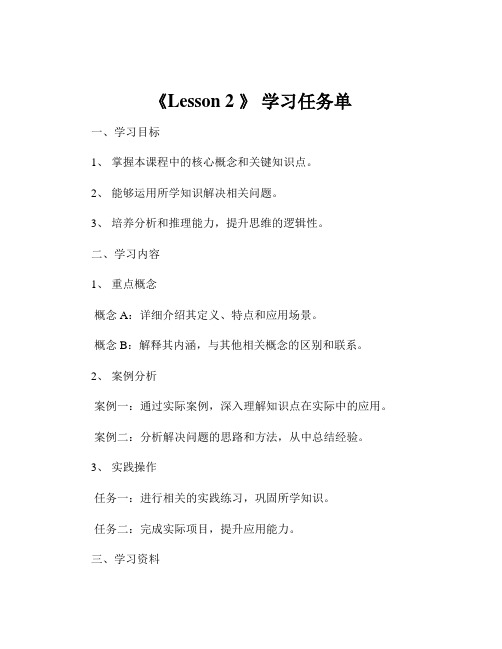
《Lesson 2 》学习任务单一、学习目标1、掌握本课程中的核心概念和关键知识点。
2、能够运用所学知识解决相关问题。
3、培养分析和推理能力,提升思维的逻辑性。
二、学习内容1、重点概念概念 A:详细介绍其定义、特点和应用场景。
概念 B:解释其内涵,与其他相关概念的区别和联系。
2、案例分析案例一:通过实际案例,深入理解知识点在实际中的应用。
案例二:分析解决问题的思路和方法,从中总结经验。
3、实践操作任务一:进行相关的实践练习,巩固所学知识。
任务二:完成实际项目,提升应用能力。
三、学习资料1、教材章节:指定教材的相关章节内容。
2、在线课程:提供的相关在线课程链接。
3、参考书籍:推荐的相关参考书籍。
四、学习方法1、预习在学习新内容之前,先浏览相关资料,对将要学习的内容有初步的了解。
2、听讲认真听讲课程内容,做好笔记,重点记录关键知识点和不理解的地方。
3、复习课后及时复习所学内容,整理笔记,加深对知识点的理解和记忆。
4、讨论与同学或老师进行讨论,分享自己的想法和见解,解决疑惑。
5、实践积极参与实践操作,将理论知识应用到实际中,提高解决问题的能力。
五、学习进度安排1、第一阶段(时间区间 1)完成知识点的学习和理解。
完成相关的练习题。
2、第二阶段(时间区间 2)参与小组讨论,分享学习心得。
完成实践操作任务。
3、第三阶段(时间区间 3)进行自我评估和总结。
针对薄弱环节进行强化学习。
六、学习评估1、作业评估按时完成布置的作业,根据作业完成情况进行评估。
2、考试评估定期进行阶段性考试,检测对知识的掌握程度。
3、实践评估根据实践操作的成果和表现进行评估。
七、注意事项1、保持良好的学习态度,积极主动地参与学习。
2、遇到问题及时向老师或同学请教,不要积累问题。
3、合理安排学习时间,避免拖延和临时抱佛脚。
新概念英语第一册 Lesson2 讲义

倒背如流新概念一上Unit2 Sorry,sir【Word】umbrella n. 伞please int. 请here adv. 这里my 我的ticket n. 票number n. 号码five num 五sorry adj 对不起的sir n. 先生cloakroom n. 衣帽间★here adv.这里地点副词:(在英语中,时间副词、地点副词的前面不能加介词)here 这里there 那儿home 家(副词,名词)★five num.五one,two,three,four,five,sir,seven,eight,nine,ten★sir n.先生①对不相识的男子、年长者或上级的尊称What can I do for you, sir? 先生,您要买什么?②sir通常用于正式信函开头的称呼:Dear Sir③Sir可用于有爵士称号者的名字或姓名前,但不用于姓氏前。
madam:女士,夫人Mr.:先生-----mister:加在男性的姓氏前面Mrs.:夫人(已婚的)----mistressMiss:小姐,一般用于指末婚女子,不过在不知道对方是否已婚时也可使用(两种发音:[mis] 已婚未婚均可;[miz]即不愿意被称为已婚,又不愿意被称为未婚)gentleman 绅士,对男性比较有礼貌的称呼,在公众场合最得体的称呼lady 女士ladies and gentlemenmale 男性female 女性man 男人woman 妇女【Text】My coat and my umbrella, please. Here is my ticket.Thank you, sir. Number five.Here's your umbrella and your coat.This is not my umbrella.Sorry sir. Is this your umbrella?No, it isn't.Is this it?Yes, it is.Thank you very much.【Useful Expressions】•1.My coat and my umbrella please.•请把我的大衣和伞拿给我,这是一个省略形式的祈使句,倒背如流新概念一上•完整的句子应为:Give me my coat and my umbrella, please.•口语中,在语境明确的情况下通常可省略,•如:(Show me your) Ticket, please. 请出示你的票。
(完整)新概念英语第二册第二课(包含课文、练习及答案)

新概念英语二 Lesson 2Lesson 2 Breakfast or lunch?First listen and then answer the question。
听录音,然后回答以下问题.Why was the writer’s aunt surprised?It was Sunday. I never get up early on Sundays。
I sometimes stay in bed until lunch time. Last Sunday I got up very late. I looked out of the window。
It was dark outside. ‘What a day!' I thought。
‘It’s raining again。
’ Just then, the telephone rang。
It was my aunt Lucy。
‘I've just arrived by train,' she said。
‘I’m coming to see you.'‘But I'm still havi ng breakfast,’ I said。
‘What are you doing?’ she asked。
‘I'm having breakfast,' I repeated。
‘Dear me,' she said. ‘Do you always get up so late?It's one o’clock!'New words and expressions 生词和短语until prep. 直到 outside adv. 外面ring v. (铃、电话等)响 aunt n。
姑,姨,婶,舅母repeat v。
重复Note on the text 课文注释1 on Sundays,指每个星期日。
《Lesson 2》 导学案
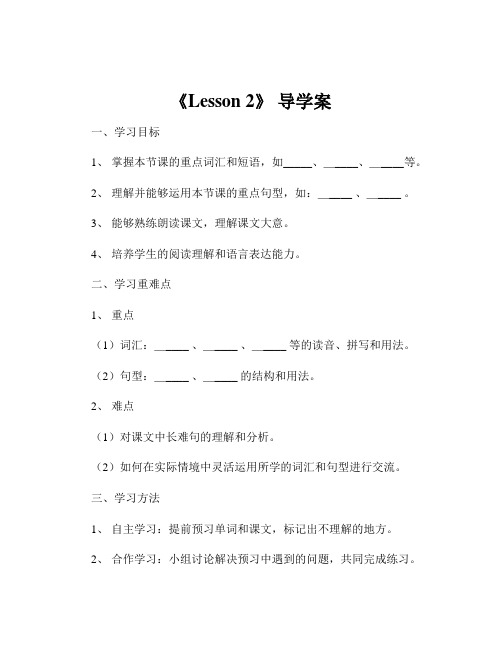
《Lesson 2》导学案一、学习目标1、掌握本节课的重点词汇和短语,如_____、_____、_____等。
2、理解并能够运用本节课的重点句型,如:_____ 、_____ 。
3、能够熟练朗读课文,理解课文大意。
4、培养学生的阅读理解和语言表达能力。
二、学习重难点1、重点(1)词汇:_____ 、_____ 、_____ 等的读音、拼写和用法。
(2)句型:_____ 、_____ 的结构和用法。
2、难点(1)对课文中长难句的理解和分析。
(2)如何在实际情境中灵活运用所学的词汇和句型进行交流。
三、学习方法1、自主学习:提前预习单词和课文,标记出不理解的地方。
2、合作学习:小组讨论解决预习中遇到的问题,共同完成练习。
3、探究学习:深入思考课文中的知识点,提出自己的见解和疑问。
四、学习过程1、预习检测(1)检查学生对重点词汇的预习情况,通过听写或提问的方式进行。
(2)让学生朗读课文,纠正发音错误,初步了解学生对课文的熟悉程度。
2、词汇学习(1)讲解重点词汇的读音、拼写、词性和常见搭配。
(2)通过例句让学生理解词汇的用法,鼓励学生模仿造句。
3、句型学习(1)分析重点句型的结构和语法规则。
(2)创设情境,让学生进行句型操练,巩固所学知识。
4、课文学习(1)让学生快速阅读课文,概括文章的主要内容。
(2)逐段分析课文,讲解文中的重点和难点,帮助学生理解课文。
(3)组织学生进行小组讨论,交流对课文的理解和感受。
5、练习巩固(1)布置与词汇、句型和课文相关的练习题,让学生独立完成。
(2)通过讲解练习题,及时反馈学生的学习情况,针对存在的问题进行强化训练。
6、拓展提升(1)提供一些与课文主题相关的拓展阅读材料,扩大学生的知识面。
(2)引导学生根据所学内容进行写作练习,提高语言综合运用能力。
7、课堂小结(1)回顾本节课所学的重点词汇、句型和课文内容。
(2)总结学生在学习过程中的表现和存在的问题,提出改进的建议。
8、课后作业(1)背诵课文中的重点段落。
冀教版八年级英语上册课件:课件Lesson 2

Wang Mei is describing her picture. Listen and answer.
How old is she? She is 13 years old.
If you were Wang Mei, can you say more to describe the picture?
Li Ming and Wang Mei are talking about their photos for the class picture. Listen and circle the correct answers. Pay attention to the use of “advise” and “agree”.
Wang Mei: I like the colour in the first picture, but it’s up to you.
Li Ming: OK. I agree with you. Thanks! Let’s glue our picture on the big paper…
Picture of
How do you know Li Ming chose the picture of him planting trees? Read and underline the key sentences for the question.
Li Ming: I have two pictures. Which one should I use? What do you think?
you glue.
I think you should turn left.
When you tell someone what he/she should do,
Lesson 2 口译教程参考译文
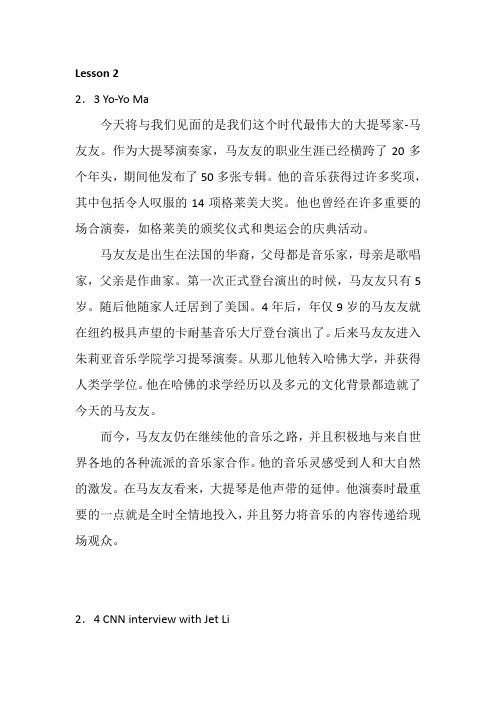
Lesson 22.3 Yo-Yo Ma今天将与我们见面的是我们这个时代最伟大的大提琴家-马友友。
作为大提琴演奏家,马友友的职业生涯已经横跨了20多个年头,期间他发布了50多张专辑。
他的音乐获得过许多奖项,其中包括令人叹服的14项格莱美大奖。
他也曾经在许多重要的场合演奏,如格莱美的颁奖仪式和奥运会的庆典活动。
马友友是出生在法国的华裔,父母都是音乐家,母亲是歌唱家,父亲是作曲家。
第一次正式登台演出的时候,马友友只有5岁。
随后他随家人迁居到了美国。
4年后,年仅9岁的马友友就在纽约极具声望的卡耐基音乐大厅登台演出了。
后来马友友进入朱莉亚音乐学院学习提琴演奏。
从那儿他转入哈佛大学,并获得人类学学位。
他在哈佛的求学经历以及多元的文化背景都造就了今天的马友友。
而今,马友友仍在继续他的音乐之路,并且积极地与来自世界各地的各种流派的音乐家合作。
他的音乐灵感受到人和大自然的激发。
在马友友看来,大提琴是他声带的延伸。
他演奏时最重要的一点就是全时全情地投入,并且努力将音乐的内容传递给现场观众。
2.4 CNN interview with Jet LiCNN 记者:祝贺《英雄》所取得的成功。
请问您在《英雄》里扮演的角色是否与你通常演的角色很相似呢?JL: It is a very special part and a very special movie. I think it’s one of the most important action movies in my life.CNN 记者:为什么你会这样说呢?你演过近30部电影,而《英雄》是如何与其他影片不同的呢?JL: Usually action films have a formula: a child whose parents have been murdered by the bad guys tries hard to learnmartial arts and he grows up into an outstandingKongfu master. He takes revenge and kills the badguys. But “Hero” has a much broader theme.CNN 记者:就比如很像《卧虎藏龙》?JL: No, it’s totally different. I think Ang Le e is a very talented director.He uses martial arts to talk about love and girls, youknow… But Zhang Yimou tries to tell about Chineseculture, Chinese thinking and their hopes throughmartial arts.CNN 记者:含义的确很深。
Lesson 2 Relaxing课件

relax
Relaxation relaxing relaxed stress stressful stressed
Task 1
You are to do some listening, Before it think about your school life, list the things( at least 3 ) you do and your feeling about them. ( A=Activity, F=Feeling )
Expressions for your reference: prepare for an exam; lie on the beach; wait for the result of; give a talk in English; do shopping with
Task 2
Group work
Relaxation
Sometimes it is ______, and much easier, to ______ time out from life to sit back and take in some ______ away from your ______, and ______. It is for this ______ that relaxation is so ______ with many people, and possibly why many people ______ this to the actual work. Relaxation on its______ is said to be as ______ as sleep, and is indeed an important ______ of sleep, it being very difficult to sleep if you are not ______ . At the very least, relaxation is ______to do a great deal ______ you if you are ______ or unwilling to attain the required level of consciousness required for actual slumber.
lesson 2冀教版九年级第二课

Listen and fill in the blanks
Read and Write T or F
1) Wang Mei was scared to see the dentist. 2) Wang Mei showed great interest in everything at the dentist’s office. 3) Dr. Hu asked Wang Mei to watch TV while she worked. 4) Dr. Hu was kind and good at fixing teeth. 5) Wang Mei’s mum told her an old Russion story on the way home. ( T) (F) (F ) (T) ( F)
1. She’s had a pain in her tooth all day. toothache 2.I was late, but luckily the train was late, too. fortunately 3.The students complete the activities on their computers and wear their headphones to talk to their teacher. headsets 4.These bananas will go bad in a week. rotten
二、单项选择。 (B )6.Bob's teeth hurt, so he went to the ________. A.policeman B.Dentist C.pilot D.teacher ( A )7.(2017·江苏泰州)Now most young people like shopping online because they ________ spend a lot of time going from shop to shop. A.needn't B.can't C.mustn't D.shouldn't
新概念英语第三册-Lesson2

• 10.“We'll get used to that Bill,” said the vicar. “13 is not as good as one but it's better than nothing. Now let's go downstairs and have a cup of tea.”
3.One night, however, our vicar woke up with a start: the clock was striking the hours!
• ★However • 在口语中, 主要用于句首;在作文中, 最好 用在句中、句尾。要用逗号分隔开来。
• • • •
★Start n.vt.惊跳, 惊起 -- The noise made him started(v.). -- What a start you gave me. -- he stood up with a start(n.).
★raise
• • • • • •
[reɪz]
v. 募集,筹款
4) v. 种植 raise wheat 种植小麦 5) v. 招募 raise an army 招募一支军队 6) v.提出,发出 raise a cheer 发出欢呼声
★torchlight [’tɔ:tʃlaɪt]n. 电筒光 • torch n.手电筒
Note on the text 课文详解
1.Our vicar is always raising money for one cause or another, but he has never managed to get enough money to have the church clock repaired. • ★ 现在进行时和 always等频度副 词搭配时:表示说 话人带有某种的情 感色彩。
《Lesson 2》 说课稿

《Lesson 2》说课稿尊敬的各位评委、老师:大家好!今天我说课的内容是《Lesson 2》。
下面我将从教材分析、学情分析、教学目标、教学重难点、教学方法、教学过程以及教学反思这几个方面来展开我的说课。
一、教材分析《Lesson 2》是教材名称中的重要一课,它在整个教材体系中起着承上启下的作用。
本节课的主要内容包括具体的知识点和语言点。
通过对这节课的学习,学生将进一步巩固和拓展之前所学的知识,为后续的学习打下坚实的基础。
教材在编排上注重知识的系统性和连贯性,通过生动的情景和丰富的练习,引导学生逐步掌握语言知识和技能。
同时,教材还注重培养学生的语言运用能力和思维能力,鼓励学生在实际情境中运用所学知识进行交流和表达。
二、学情分析我所教授的学生是具体年级和班级的学生。
他们已经具备了一定的英语基础,对英语学习有一定的兴趣和积极性。
但是,学生的英语水平参差不齐,部分学生在语言表达和语法运用方面还存在一些困难。
此外,学生的学习风格和认知方式也有所不同,有的学生擅长听力和口语,有的学生则更擅长阅读和写作。
因此,在教学过程中,我将根据学生的实际情况,采取多样化的教学方法和手段,满足不同学生的学习需求,激发学生的学习兴趣,提高课堂教学效果。
三、教学目标基于对教材和学情的分析,我制定了以下教学目标:1、知识目标学生能够掌握本节课的重点单词和短语,如单词和短语列举。
学生能够理解并正确运用本节课的重点句型,如句型列举。
2、技能目标能够听懂与本节课主题相关的听力材料,并获取关键信息。
能够运用所学的语言知识进行简单的口头和书面表达,描述相关主题。
3、情感目标培养学生的学习兴趣,增强学习自信心。
培养学生的合作意识和团队精神,提高学生的人际交往能力。
四、教学重难点1、教学重点重点单词和短语的记忆和运用。
重点句型的理解和掌握。
2、教学难点如何引导学生在实际情境中灵活运用所学的语言知识进行交流和表达。
帮助学生克服语言表达中的语法错误和发音问题。
《Lesson 2》 导学案
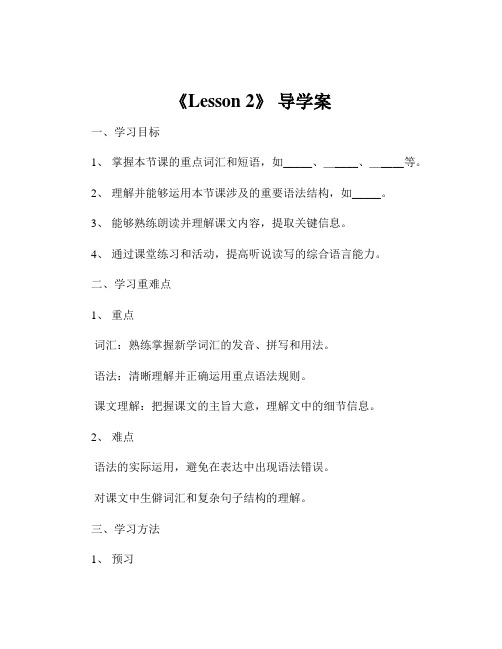
《Lesson 2》导学案一、学习目标1、掌握本节课的重点词汇和短语,如_____、_____、_____等。
2、理解并能够运用本节课涉及的重要语法结构,如_____。
3、能够熟练朗读并理解课文内容,提取关键信息。
4、通过课堂练习和活动,提高听说读写的综合语言能力。
二、学习重难点1、重点词汇:熟练掌握新学词汇的发音、拼写和用法。
语法:清晰理解并正确运用重点语法规则。
课文理解:把握课文的主旨大意,理解文中的细节信息。
2、难点语法的实际运用,避免在表达中出现语法错误。
对课文中生僻词汇和复杂句子结构的理解。
三、学习方法1、预习提前预习新单词,查阅词典了解其含义和用法。
通读课文,尝试理解大致内容,标记出不懂的地方。
2、课堂学习认真听讲,积极参与课堂互动,回答老师的问题。
做好笔记,记录重点知识和自己的疑问。
与同学进行小组讨论,共同解决问题。
3、复习课后及时复习所学内容,背诵单词和重点句型。
完成课后练习题,巩固所学知识。
多读多写,加强语言的实际运用能力。
四、学习过程1、词汇学习老师讲解新单词的发音、词性、词义和用法,并举例说明。
学生跟读单词,练习发音。
进行单词拼写练习,强化记忆。
2、语法讲解老师通过例句和情景,引入本节课的语法点。
详细讲解语法规则,分析语法结构。
学生做相关语法练习题,加深对语法的理解和运用。
3、课文学习老师领读课文,学生跟读,注意语音语调。
学生自主阅读课文,回答老师提出的问题,理解课文内容。
分析课文中的重点句子和段落,讲解语言点。
4、课堂活动小组活动:根据课文内容进行角色扮演或讨论。
个人展示:让学生用所学知识进行口头表达或书面写作。
5、课堂总结老师总结本节课的重点内容,强调易错点和难点。
学生回顾自己的学习成果,提出疑问。
五、课后作业1、背诵本节课的重点单词和短语。
2、完成课本上的练习题。
3、用所学语法和词汇写一篇短文,描述一个场景或事件。
六、拓展学习1、阅读相关的英语文章,扩大词汇量和提高阅读理解能力。
新概念英语第三册Lesson-2
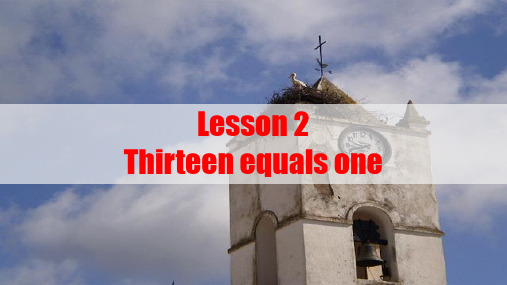
equal
adj.相等的
※ be equal to ...
※ equality ※ sexual equality/racial equality
raise
v.举起
raise your hand raise your voice raise your glass (to sb) raise a flag raise the roof raise one’s eyebrows (at/over...)
-- No one equals him in singing. matches
equal
n.同等的人;相等物;匹敌者
※ without equal/ have no equal 无敌;无与伦比
-- She has no equal in English in her class. -- She is a ski player without equal.
v Christianity v Buddhism v Islam
part 2 New words and expressions
equal raise vicar torchlight
v.等于 v.筹集;筹(款) n.牧师 n.电筒光
equal raise vicar torchlight
He is constantly going to the gym these days. When I am travelling, I normally use my laptop. I will instant message with a friend.
Our vicar is always raising money for one cause or another, but he has never managed to get enough money to have the church clock repaired.
新概念英语第四册课文及翻译:Lesson2
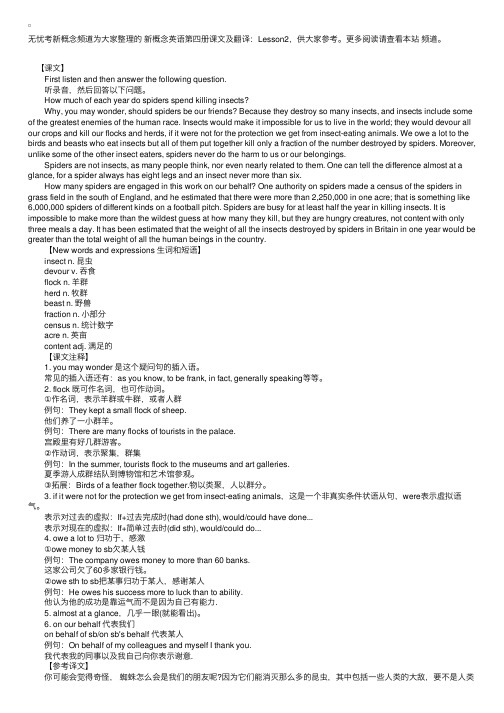
⽆忧考新概念频道为⼤家整理的新概念英语第四册课⽂及翻译:Lesson2,供⼤家参考。
更多阅读请查看本站频道。
【课⽂】 First listen and then answer the following question. 听录⾳,然后回答以下问题。
How much of each year do spiders spend killing insects? Why, you may wonder, should spiders be our friends? Because they destroy so many insects, and insects include some of the greatest enemies of the human race. Insects would make it impossible for us to live in the world; they would devour all our crops and kill our flocks and herds, if it were not for the protection we get from insect-eating animals. We owe a lot to the birds and beasts who eat insects but all of them put together kill only a fraction of the number destroyed by spiders. Moreover, unlike some of the other insect eaters, spiders never do the harm to us or our belongings. Spiders are not insects, as many people think, nor even nearly related to them. One can tell the difference almost at a glance, for a spider always has eight legs and an insect never more than six. How many spiders are engaged in this work on our behalf? One authority on spiders made a census of the spiders in grass field in the south of England, and he estimated that there were more than 2,250,000 in one acre; that is something like 6,000,000 spiders of different kinds on a football pitch. Spiders are busy for at least half the year in killing insects. It is impossible to make more than the wildest guess at how many they kill, but they are hungry creatures, not content with only three meals a day. It has been estimated that the weight of all the insects destroyed by spiders in Britain in one year would be greater than the total weight of all the human beings in the country. 【New words and expressions ⽣词和短语】 insect n. 昆⾍ devour v. 吞⾷ flock n. ⽺群 herd n. 牧群 beast n. 野兽 fraction n. ⼩部分 census n. 统计数字 acre n. 英亩 content adj. 满⾜的 【课⽂注释】 1. you may wonder 是这个疑问句的插⼊语。
新概念英语第二册Lesson 2

文化背景
早餐吃什么 V.S. 午餐怎么吃
歪果仁 早餐吃什么
New words and expressions
• until [ʌn'til]
If something happens until a particular time, it happens during the period before that time and stops at that time. 直到...才;直到...为止
it 的用法 1)人称代词 一般代指无生命的东西或有生命的动物,在不分性别或情况不详时指代 This is my watch. It's a Swiss one. The baby smiled when it saw its mother. 2)用作无人称动词的主语时,表示“时间、天气、距离” It's quite early yet. It's getting dark outside. It's not far from here. It's so cold now.
New words and expressions
• aunt [ɑːnt] [ænt]
the sister of your father or mother; the wife of your uncle
姨母; 舅母; 姑母; 伯母; 婶母
uncle ['ʌŋkl]
the brother of your father or mother; the husband of your aunt 叔叔;伯父;伯伯;舅父;姨丈;姑父
Notes on the text
新概念二Lesson 2 知识点整理

look out= watch out = be careful小心
例:Look out!The car is coming!
look through浏览
look into调查
look at看= have a look看一看
3.Just then, the telephonerang.Itwas my aunt Lucy.
就在这时,电话响了,是我的姑姑露西。
(a)just then就在那时
近义短语:at that moment
(b)ring (过去式rang)v.
1)(铃、电话等)响(刺耳的)
注:这种响是刺耳的,往往提醒某人做某事。
例:The door bell is ringing.门铃正在响。
2)给某人打电话ring sb.
3.Isometimes stay in bed until lunchtime.
was dark outside.
5.Ihave just arrived by train.
6.What are you doing?
7.Dear me!
8.Do you always get up so late?
重点语法
重点语法
1.until的用法
prep.直到
直到...才;直到...为止not…until
后面加(时间状语)从句,前面就是主句, until在肯定句中与表示持续性状态的动词连用,在否定句中与描述短暂动作的动词连用。
1) His father didn't die until he came back. (肯定)
例:TomorrowI’ll ring you.
新概念英语第一册Lesson2课件
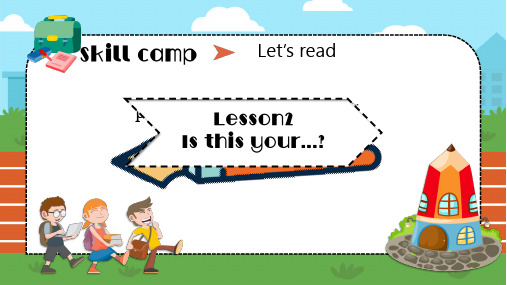
含有be动词的一般疑问句的构成:
但如果句子主语是第一人称,变成一般疑问句时 要将主语换成第二人称。如:
I’m a student.
Are you a student?
一般疑问句的回答:
一般疑问句的肯定回答一般为 “Yes,...”, 而否定 回答为 “No,...”。如:
Is this your house? 这是你的房子吗?
一般疑问句的概念: 能用yes/no(或相当于yes/no)回答的问句叫一般 疑问句。
含有be动词的一般疑问句的构成:
当陈述句中有be动词(am, is, are)时,可直接将 be动词提至主语前。如:
He is a worker.
She is eleven years old.
Is he a worker? Is she eleven years old?
Let’s write
提示词:excuse, yes, shoe, pardon, thank
Is thEixscuyoseurmseh!oe?
Thank PYyeaoYsrued.istov?iensr?.y much.
英语中be动词有am, is, are三种形式,它们分别和不同的人 称代词连用,我们先来学一学is的用法。请看下表:
Amazing world
Hi, guys!你们听过“包治百病” 这个词语吗?它的本意是“一 切疾病都可以治疗。”,不过 现在网络的流行说法是“包包 可以缓解女性不开心的情绪。” 可见,女士们对handbag的钟 爱啦!下面,请跟我一起看看 世界顶级品牌之一的迪奥包包 的制作过程吧!
This
your
pen.
It
is
your
watch.
新概念英语第二册Lesson2完整课件

③ n. (打)电话 give sb. a ring 记得打电话给我! Remember to give me a ring.
④ n. 戒指 wedding ring
aunt n. 姑,姨,婶,舅妈 uncle n.叔叔,舅舅,姑父 他们的孩子:cousin[ˈkʌzn] 堂兄妹(不分男女) cousin的孩子:
'Do you always get up so late? It's one o'clock!'
I'm coming to see you. 用 come 的现在进行时态 be coming 表示一般将来,表示 近期按计划或安排要进行的动作。 同样用法的动词有: go,come,leave,arrive… 你马上就要离开吗? Are you leaving at once? 明天他就到了。 He is arriving tomorrow.
repeat v. 重复 不要重复! Don't repeat!
他们正在重复那个有趣的游戏。 They are repeating that interesting game.
Why was the writer's aunt surprised?
It was Sunday. I never get up early on Sundays . I sometimes stay in bed until lunchtime. Last Sunday I got up very late. I looked out of the window. It was dark outside . 'What a day!' I thought. 'It's raining again.' Just then, the telephone rang . It was my aunt Lucy. 'I've just arrived by train,' she saidSu.nd'aI'yms coming to see you.'
新概念英语第二册Lesson2课件

look into 1. 向...里看
look into the box 2. 调查,分析
向盒子里面看
The police are looking into the case. 警察正在调查这个案件。
Look out ! 小心,当心
Look out ! The car nearly knocked you over.
2021/3/11
15
How +形容词 + 主语 + 谓语 How careless she is!
当 What +(a/an)+形容词+人称代词(+be动词时, 两者完全相等 What an interesting story it is! = How interesting the story is! What a clever girl she is! = How clever she is!
11学习交流ppt时间范围较广表示某年某季节某月某周某一天的某段时间year在一年中may在五月march7thmondayafternoon在周一下午march7th2013twooclock在两点moment在这一刻注意
Lesson2 Breakfast or lunch?
a story about a man who doesn't like getting up early on Sundays.
6
eg: He___until it stopped raining. A.waited B.didn't wait A.leave. B.left C.didn't leave
• We stayed until the rain stopped. • 我们一直等到雨停为止。 • We didn’t start until the rain stopped. • 直到雨停了我们才出发。 • 她六点才能来。
- 1、下载文档前请自行甄别文档内容的完整性,平台不提供额外的编辑、内容补充、找答案等附加服务。
- 2、"仅部分预览"的文档,不可在线预览部分如存在完整性等问题,可反馈申请退款(可完整预览的文档不适用该条件!)。
- 3、如文档侵犯您的权益,请联系客服反馈,我们会尽快为您处理(人工客服工作时间:9:00-18:30)。
LESSON 21.which [hwɪtʃ]代词哪一个,哪一些形容词哪一【例句】Which one do you choose?【释义】你选哪个?Which is your pen?哪个是你的钢笔?2.do [du]动词做,干,从事【例句】How do you do?【释义】很高兴认识你。
You should do your work right now.你现在应该写作业。
3.their [ðɛr]代词他(她,它)们【例句】Their clothes are hanging in the closet.【释义】他们的衣服挂在衣柜里。
Do you know their school?你知道他们学校吗?4.time [taɪm]名词时间【例句】I have no time.【释义】我没有时间。
What’s the time now?现在几点?5.if [ɪf]连词如果,假如【例句】If you are free, could you do me a favor?【释义】如果你有空的话,你能帮我个忙吗?I will give a surprise if you win the game.如果你赢得比赛我就给你个惊喜。
6.will [wɪl]助动词将要【例句】I will go to the supermarket.【释义】我将要去超市。
Will you give me a birthday present?你要给我生日礼物吗?7.way [wei]名词路,道【例句】I am on my way home.【释义】我正在回家的路上。
I can’t find my way.我不能找到路了。
8.about [əˈbaʊt]介词关于【例句】What about you?【释义】你呢?This is a book about math problem.这是一本关于数学的书。
9.many [ˈmɛni]形容词许多,多的【例句】There are many people in the hall.【释义】大厅里有很多人。
How many eggs do you want?你要几个鸡蛋?10.hen [hɛn]名词母鸡【例句】There is a hen in the room.【释义】屋里有一只母鸡。
I can see some hens in the farm.我在农场里能看到一些母鸡。
11.them [ðɛm]代词他们的宾格【例句】You shouldn’t tell them the story.【释义】你不应该告诉我这个故事。
I don’t know them at all.我一点都不知道他们。
12.write [raɪt]动词写【例句】Please write down your name.【释义】请写下你的名字。
He is writing a letter.他正在写信。
13.would [wʊd]助动词将;愿意【例句】What would you like?【释义】你喜欢什么?I would like a cup of tea.我想要一杯茶。
14.like [laɪk]动词喜欢【例句】Do you like swimming?【释义】你喜欢游泳吗?She likes going to school by bus.她喜欢乘公交车去学校。
15.so [səu]副词非常;这样;同样,也【例句】I don’t think so.【释义】我不这么认为。
You like watching TV, so do I.你喜欢看电视,我也是。
16.these [ðiz]形容词,代词this的复数【例句】These are my new books.【释义】这些是我的新书。
I like these green T-shirts.我喜欢这些绿色的T恤。
17.her [hɚ]代词她的【例句】Her name is Candy.【释义】她的名字叫Candy。
Do you like her blue skirt?你喜欢她的蓝裙子吗?18.long [lɔŋ]形容词长的,长时间的【例句】It’s a long way.【释义】这条路很长。
Long long ago很久以前。
19.make [meik]动词做,制作,完成,整理【例句】I will make it.【释义】我会完成的。
You should make your beds.你应该整理床铺。
20.thing [θɪŋ]名词物品,东西,事情【例句】You should pay attention to these things.【释义】你应该注意这些事情。
You have to keep these things in your mind.你必须将这些事情放在心上。
21.see [si:]动词看见,观看;理解,考虑【例句】Can you see that boy?【释义】你能看见那个男孩吗?I see.我知道了。
22.him [hɪm]代词他的宾格【例句】I don’t understand him.【释义】我不理解他。
I want to give him a gift.我想送他一份礼物。
23.two [tu]数词二,两个【例句】There are two men in the room.【释义】这屋里有两个人。
It’s two o’clock now.现在两点了。
24.has [hæz]have 的第三人称单数现在式【例句】He has a black car.【释义】他有一辆黑色轿车。
She has no place to go.她无处可去。
25.look [lʊk]动词看,瞧【例句】Please take a look at the book.【释义】请看一下这本书。
They are looking at the door.他们正在注视着那扇门。
26.more [mɔr]副词更,更加【例句】More or less.【释义】差不多。
This picture is more beautiful than that one.这幅画比那幅漂亮。
27.day [dei]名词一天,白天【例句】What’s the day today?【释义】今天是星期几?How many days are there in a week?一个星期有几天?28.could [kʊd]助动词表示允准,请求,结果【例句】Could you please do me a favor?【释义】你能帮我个忙么?I could have finished my work.我本可以完成我的工作。
29.go [ɡəu]动词走,去【例句】Let’s go.【释义】我们走。
Where should I go?我应该去哪里?e [kʌm]动词来,来到;到达【例句】Come on.【释义】加油。
You can come here in 10 minutes.你花10分钟就可以到这里。
31.did [did]动词do的过去式【例句】Did you see that picture?【释义】你看到那张照片了吗?I did it for you.我做这件事是为了你。
32.number [ˈnʌmbɚ]名词数【例句】I can’t remember your number.【释义】我记不住你的号码。
I ca n’t see that number clearly.我看不清楚那个号码。
33.sound [saʊnd]动词发出声响,听起来名词声音,响声【例句】It sounds really great.【释义】这听起来真棒。
Can you hear that sound?你能听见那个声音吗?34.no [nəʊ]副词不,不是形容词没有的【例句】No problem【释义】没问题。
There’s no one in the room.这间屋里没有人。
35.most [məust]副词最,很,非常代词大多数,大部分【例句】Most of us are going to the party.【释义】我们大部分都要去参加聚会。
I want the most.我想要最多的。
36.people [ˈpipəl]名词人,人们;人民【例句】There are a lot of people in the hall.【释义】大厅里有很多人。
People’s Republic of China中华人民共和国37.my [maɪ]代词我的, 属于我的【例句】My name is Jesse.【释义】我的名字叫Jesse。
My pleasure.我的荣幸。
38.over [ˈəuvɚ]介词在…的上面副词结束;过分地,太【例句】Game over.【释义】游戏结束。
The basket is over there.篮子就在那里。
39.know [nəu]动词知道,懂得【例句】I don’t know.【释义】我不知道。
What should I know?我应该知道什么?40.water [ˈwɔtɚ]名词水【例句】I want to drink some water.【释义】我想喝点水。
a glass of water一杯水41.than [ðæn]连词比【例句】You are taller than him.【释义】你比他高。
There is nobody more lovely than you.这里没人比你更可爱。
42.call [kɔl]动词叫,喊;通电话;称呼【例句】Remember to give me a call.【释义】记着给我打个电话。
What should I call you?我应怎么称呼你?43.first [fɚst]形容词第一的,最初的名词第一(个人或事物)【例句】You have got the first place.【释义】你是第一名。
I am the first one to get there.我是第一个到这里的。
44.who [hu]代词谁,什么人【例句】Who is that girl?【释义】那个女孩是谁?Who do you like best?你更喜欢谁?45.may [mei]助动词可以;也许;会,可能【例句】May I open the door?【释义】我能打开门么?I may give him a surprise我可能会给他一个惊喜。
.46.down [daʊn]副词向下,在下面【例句】Please write down your name.【释义】请写下你的名字。
Sit down please.请坐。
